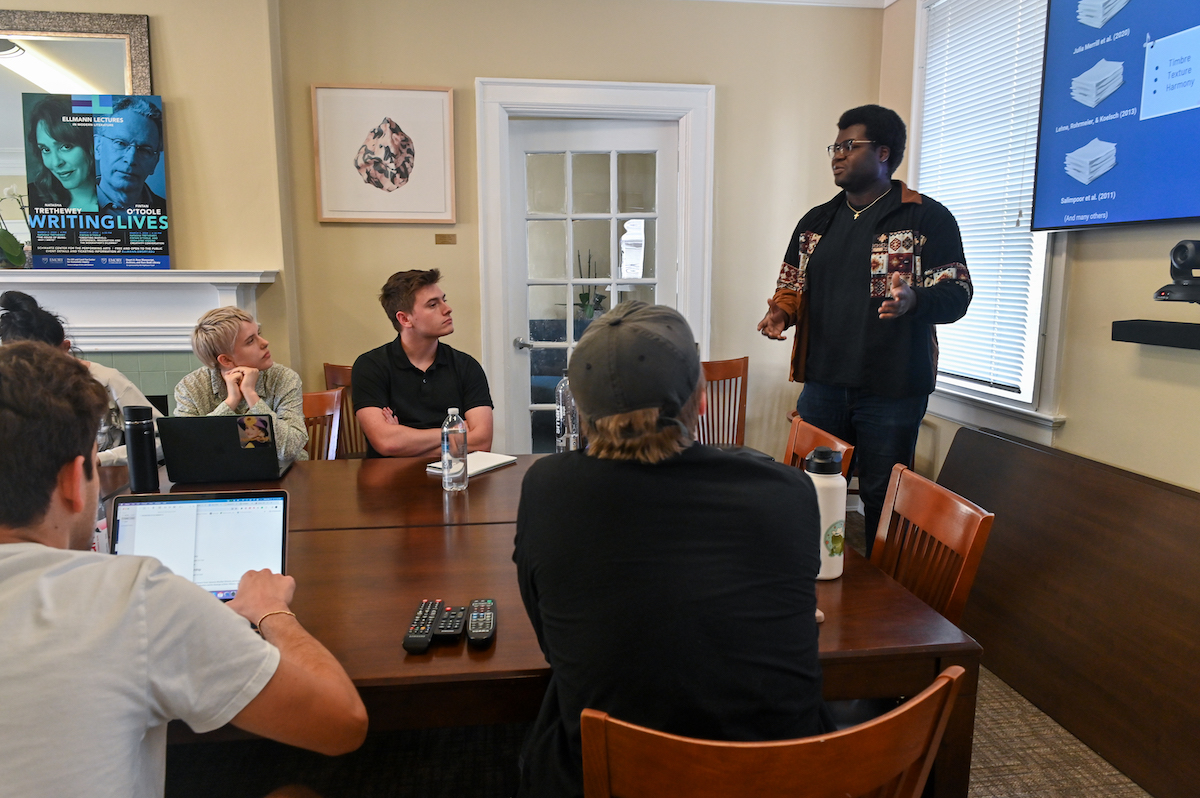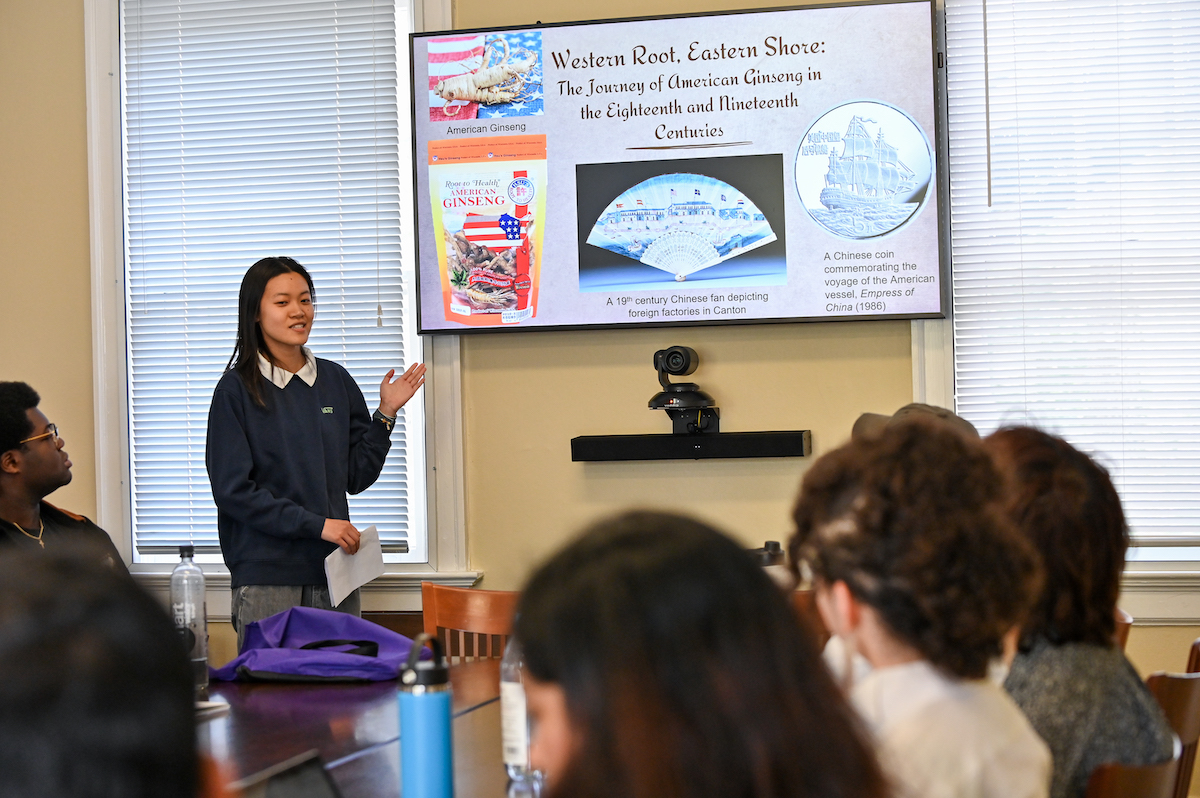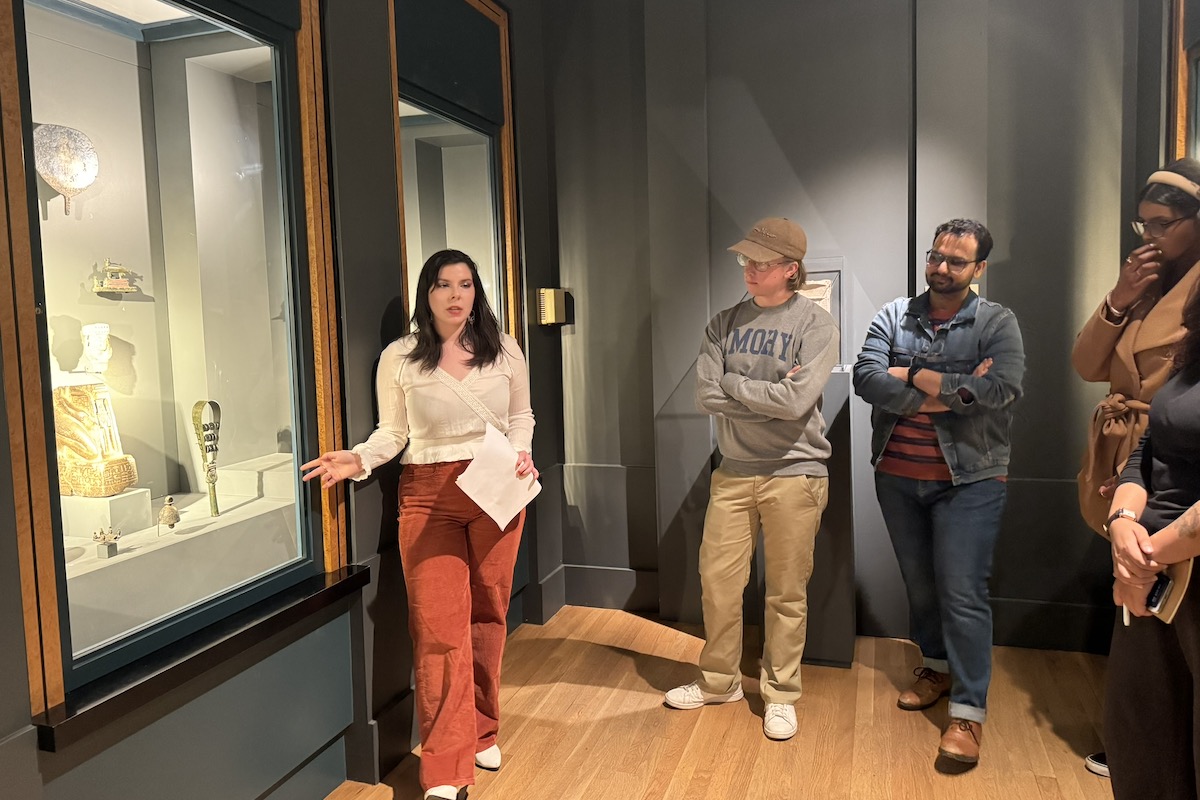Ask Carla Freeman her vision of what the Fox Center for Humanistic Inquiry is on its way to becoming and the answer is short but powerful: “An intellectual center of gravity at Emory.”
In the year since being named director of the Fox Center, Freeman — the Goodrich C. White Professor of Women’s, Gender and Sexuality Studies — has been making good on her promise to formulate new partnerships and develop innovative ways to foster deep intellectual engagement across the university.
She is also bringing design changes to established programs such as the Undergraduate Humanities Honors Fellows, which annually supports up to 12 students completing honors projects in a humanities or humanistic social science field. The goal is to demonstrate to students the breadth of the humanities and strengthen their writing and presentation skills while fostering interdisciplinary exchange and mentorship.
Small improvements now, broader changes later
Typically offered in spring, the Undergraduate Fellows program will move to fall in 2024-25 “to give our students a fuller experience as members of the Fox Center academic community and to allow more meaningful mentoring with our faculty, graduate students and postdocs,” says Freeman.
In the coming academic year, Freeman is instituting another new feature: a theme for the center’s work — “Democracy: Past, Present, Future.” Those who applied to the Undergraduate Fellows program by the April 8 deadline were encouraged to suggest theses that engage this topic, which Freeman formulated in consultation with other Emory faculty to interrogate how the humanities can examine and understand democracy in a time of intensified political unrest.
Shifting the Undergraduate Fellows program to fall did not stop Freeman from making enhancements this semester, starting with a one-credit seminar she is teaching with Shiv Sharma, a doctoral student in Women’s, Gender and Sexuality Studies.
The seminar provides a supportive structure for undergraduate students to work toward completing their thesis while immersing themselves in the intellectual, creative and professional environment of the humanities — something students experience all around them at the Fox Center.
Students provide meaningful feedback to one another’s projects and explore a wide range of disciplinary approaches, methodologies and epistemologies as they write their theses.
Freeman also was keen to open the center’s doors, wanting undergraduates to have immersive humanities experiences, including a trip to the Michael C. Carlos Museum and participation in the Ellmann Lectures. When the seminar shifts to the fall, these experiences will expand to include theater and museum visits off campus as well.

Siji Osunkoya — as was the case with all the Undergraduate Fellows— learned over the course of the semester to present a tight, compelling presentation of his research, which is on how music provokes emotion from a neuroscience perspective.
Photo courtesy Becky Stein
A cascade of creative ideas
Freeman would be the first to say she has not done this alone.
“When I put a call out for help in rethinking the seminar design, the response was overwhelming. All the graduate students and postdoctoral fellows, despite the pressures of writing and being on the job market, stepped up and proposed novel ways of engaging the undergraduates,” says Freeman.
Sharma collaborated in defining its new design. Key to its success, he says, “is our belief that learning to engage with a range of intellectual formations is at the heart of humanities today.”
Beyond selecting students representing diverse fields — such as art history, music, philosophy, anthropology, creative writing, English and neuroscience — the program enables Undergraduate Fellows to “think with each other, ask productive questions and find connections,” says Sharma.
“The seminar also gives them a chance to connect with senior faculty and other scholars at the Fox Center, and it empowers them to envision what their professional life may look like beyond college,” he adds.
In one seminar session, a panel of postdocs and graduate students created a snapshot of “life after college,” sharing wisdom about professional relationships — how to choose mentors and request recommendation letters. The panel also defined “pathways to publication,” strategies for building a robust profile for graduate school portfolios and taking steps toward academic careers.
Hailing from Stanford University’s art history program, Lora Webb is the Fox Center’s Two-Year Postdoctoral Fellow. She advised this semester’s students on the benefits of a writing group. With the longer runway of time in the program that the fall fellowship will afford, Webb hopes that writing groups will become firmly established, culminating in the Fox Undergraduate Fellows Colloquium when all students present their theses prior to graduation.
“I discovered how productive writing groups can be later in graduate school, and I can only imagine how beneficial it would have been to have developed strategies of accountability earlier. Further, by sharing early and often, it pushes writers to develop their ideas in audience-friendly ways and ameliorates some of the anxiety that comes with submitting a piece of writing to a professor,” Webb says.
Central to the experience of the Undergraduate Fellows are the Senior Fellows, whose mentorship is crucial. (bottom row, l to r) Michelle Armstrong-Patida, Lora Webb, Ellie Schainker and Haley Jones; (middle) Carla Freeman, Fox Center director; (top row, l to r) Grayden McCashen, Elizabeth Wilson, Susan Hylen, Christopher Spaide, J. Judd Owen and Michelle Alexis Taylor.
Photo courtesy Becky Stein
What mentorship can mean
The collaboration of Haley Jones 24PhD, the Fox Center Dissertation Completion Fellow, and Jacob Gibbs 24C, an Undergraduate Research Fellow, demonstrates what makes scholarship pursued in community valuable and why the Fox Center is a hub for that very thing.
Though Jones and Gibbs had started working together before Gibbs became an Undergraduate Fellow, their intellectual journey deepened at the Fox Center.
Jones is an Emory art history student whose work investigates the period 2000–20 in the European and North American auction market, specifically regarding how authenticity and value are derived for historical or classical arts of Africa. She has found that “these auctions center the engagements of European and North American artists, collectors and dealers with African art while decentering African artistic agency.”
One aspect of the work involved extracting quantitative data from the catalogs. Jones put out a call for undergraduate research assistants. Gibbs, a history/art history major and economics minor, answered the call.
A scholarly team forms through love of African art
“Jacob began the process with no interest or knowledge of African art, the African art market or digital humanities. He picked everything up quickly, did great work and made significant contributions,” Jones notes.
The son of physicians, with a sister headed to medical school, Gibbs was set on forging his own path, conducting research in the humanities.
He arrived at Emory interested in law and history.
“I did not,” he acknowledges, “take art history seriously separate from the larger discipline of history until taking Contemporary Art of Europe and North America with professor Lisa Lee in the first semester of my first year.”
Through that spark, Gibbs became deeply interested in the questions driving Jones.
“Why are some works valued for tens of millions when works that look similar are valued in the low ten-thousands? I quickly learned that the higher-valued works were marketed as having a relationship to a European painter or a European modernist movement. That caught my attention,” he says.
Gibbs completed his work with Jones and went abroad in his junior year, where he worked at a museum in Florence, Italy. His interest in African art ticked up again when Susan Elizabeth Gagliardi, associate professor of art history, made him aware of the “William Rubin Kota,” which in 2015 sold for €5.5, then the third-highest price for a work of African art.
“Now its selling price is the 10th highest because the market is getting inflated,” says Gibbs. “These higher valuations are bringing attention to African art and increasing what African artists can earn. But they are not profiting off these works. I am still disturbed at the profiteering on the part of American and European market players and auctioneers,” he says.

Yingyi Tan, an Undergraduate Fellow majoring in history and economics, used ginseng in her thesis to explore Chinese medical and food history, Sino-American interactions, and maritime trade history.
Photo courtesy Becky Stein
Sharing a Fox Center residency
Gibbs wanted to explore the valuation of African art in his own right and so began an honors thesis and applied to the Undergraduate Fellows program, knowing that Jones was at the Fox Center as well. Their shared academic interest has blossomed into a friendship that Gibbs knows will outlast their time at Emory.
“I was able to nurture in Jacob what has become a genuine and strong interest in this material. I have met with him several times this semester to talk about his thesis research and helped prepare him for his defense. He will go on to do great things,” Jones says.
Those “great things” will start with studying art law at Columbia Law School, where Gibbs was recently accepted.
“Of the schools I applied to, they were the only one with a class on the art market,” says Gibbs, who is also excited about being based in New York City, a home to great art. “I don’t know if I will leave there doing textbook art law. I definitely will do something related to copyright and intellectual property, ending up in the art world eventually,” Gibbs pledges.
As solid a team as Gibbs and Jones are, both acknowledge the larger support network at the Fox Center that has strengthened their effectiveness as humanities scholars.
Gibbs relishes being stimulated by “such smart people at the Fox,” and Jones concurs: “I have had a sense here of not just professional but personal support. I look forward to coming here; it is friendly and relaxed. Everyone is interested in and supportive of each other’s work.”
A place everyone thought they knew, a tour no one will forget
Just as she promised, Freeman has shooed everyone out the door to experience the humanities in other places. The Undergraduate Fellows attended this year’s Ellmann Lectures, and a tour Jones organized of the Carlos Museum received rave reviews.
At Emory since 2017, Jones knows the collection well and had led many students through it.
For this outing, she came up with a life-cycles theme, which she defines as objects that have content dealing with life cycles or objects that had an interesting life cycle in their use, collection or display.
Conceived as a tour primarily for the Undergraduate Fellows, many of the faculty and postdoctoral fellows were also eager participants.
The visit was scheduled during what Gibbs defined as “crunch time for my writing.” As a result, he says, “I went more to support Haley than to learn. That was my first mistake, not realizing what she could teach me, indeed all of us. She came up with a fascinating theme. I am jealous of students who will take her classes; she is such a great teacher.”
Sharma, too, was impressed by what he learned.
“This tour prompted us to think through critical issues underlying the collection, interpretation and exhibition of works of art in museums, with particular attention to challenges involved with displaying works of art from diverse cultures. This made the scholarship and debates within art history that I had read about feel alive and important in a very palpable way,” he notes.

Haley Jones, the Fox Center Dissertation Completion Fellow, led a tour of the Carlos primarily to benefit the Undergraduate Fellows, but the Senior Fellows also turned out to hear her talk about “life cycles” in the context of the Carlos collection.
Photo courtesy Carla Freeman
Stay tuned
Later in April, at the colloquium, the center will celebrate and showcase the completed theses of the Undergraduate Fellows.
“There is more work ahead and with new programming, outreach and collaboration, I have no doubt that the Fox Center will become an even more visible and vibrant hub for the arts and humanities,” says Freeman.
Spotlight on two Undergraduate Fellows
For a fuller look at the breadth of research undertaken by the students in this semester’s program, see the fellows page.
Majors: English/psychology
Thesis topic: The intersection of postcolonial theory and science fiction.
Quote: “In Western science fiction especially, we tend to look at technology as a problem only once it becomes sentient — when it controls itself rather than being controlled. What we need to do is examine technology in terms of the present and future: how is technology produced now; who uses it; who has access to it and who doesn’t; who is being dehumanized? That becomes a central concern, especially in Indian science fiction.”
Takeaways from the Fox Center fellowship:
- “Learning to present our findings professionally and succinctly.”
- “Having a space to work in and a network of people creating opportunities and pointing me to more resources.”
- “Understanding how my research fits into a wider humanistic framework and how it matters in the real world.”
On to great things: Mohan will pursue a PhD at Duke University in the fall.
Majors: Neuroscience and behavioral biology/music composition
Thesis topic: How music evokes emotional responses in listeners. The thesis consists of an original string quartet composition, “Imọlara,” and a written portion.
Quote: “After posting a video of myself on Instagram at an early birthday party, the app added the second movement of Rachmaninoff’s piano concerto No. 2. Though I am a composer and musician, I had never heard the music, known for evoking nostalgia. That is exactly how it hit me, so I used my expertise in neuroscience to investigate music-evoked emotion.
“I compiled a database of the music used in different studies and sorted them into emotional categories. With my musical training, how could I describe these effects? I used the elements of timbre (rough or smooth sound), texture (who is playing which sounds when?) and harmony (what chords and sound-worlds are being created?). I then built my composition with four movements to evoke joy, anger, fear and sadness.”
Takeaways from the Fox Center fellowship:
- “The passion, depth and complexity of my peers’ topics had me in awe.”
- “They taught us the priceless lesson of how to distill four years of study into five minutes to convince others — employers, graduate programs — about our projects.”
- “It was invaluable to be around others who have honed their craft to such a high level.”
On to great things: Osunkoya will attend medical school in the fall, with hopes of joining a lab studying music and medicine.

